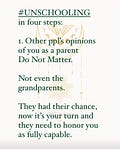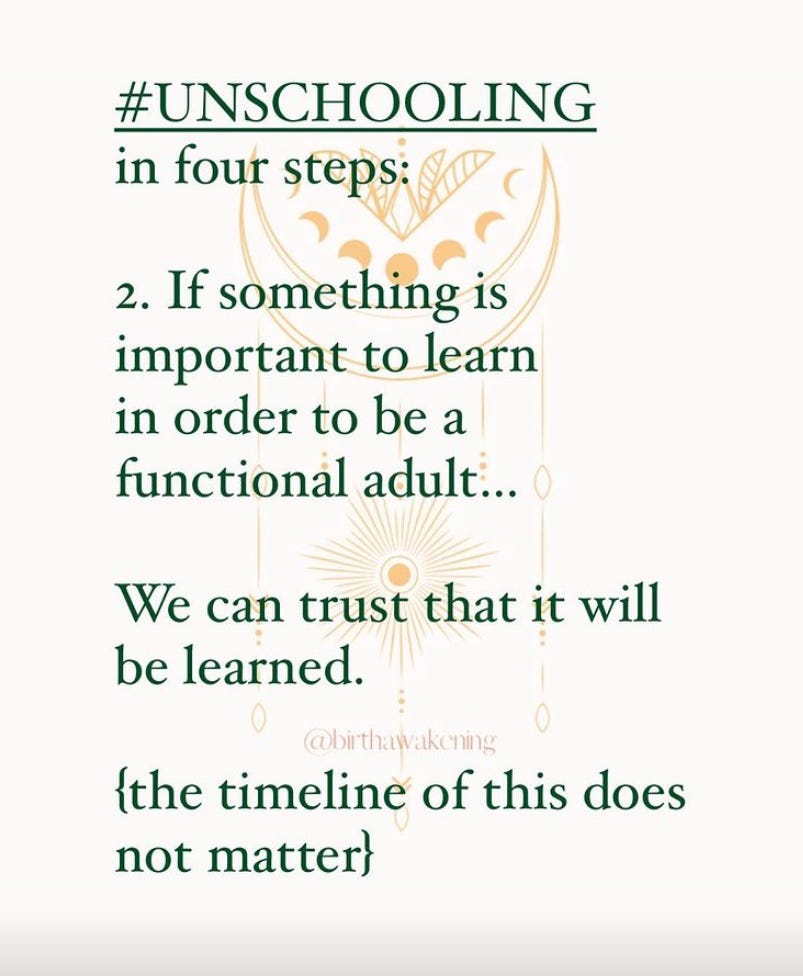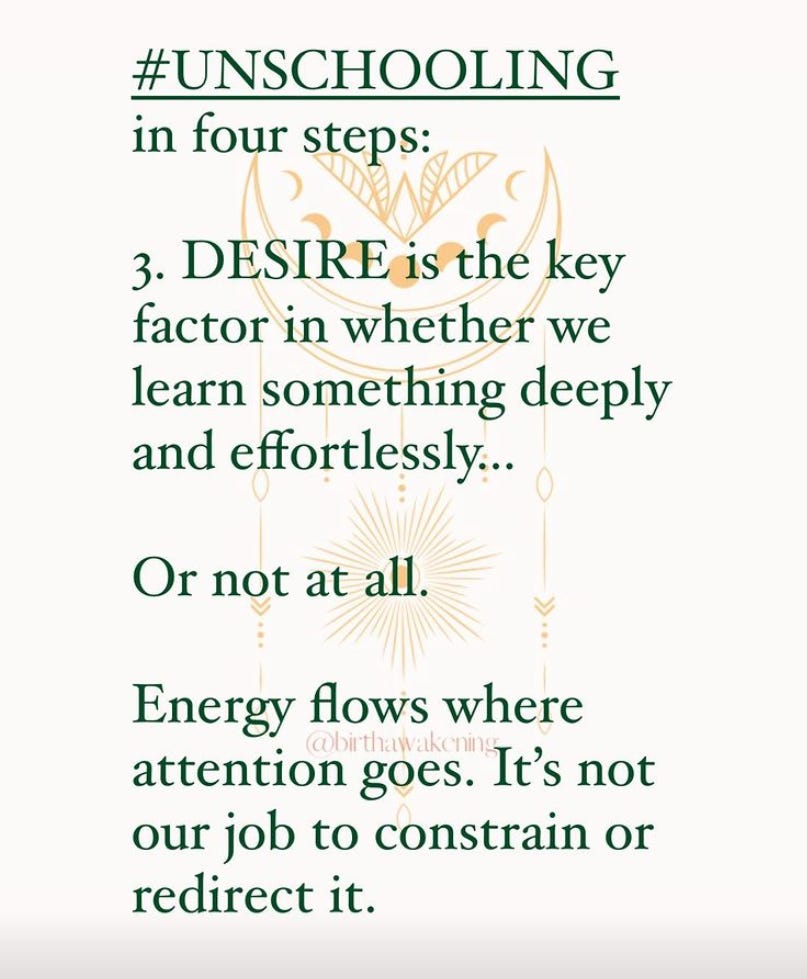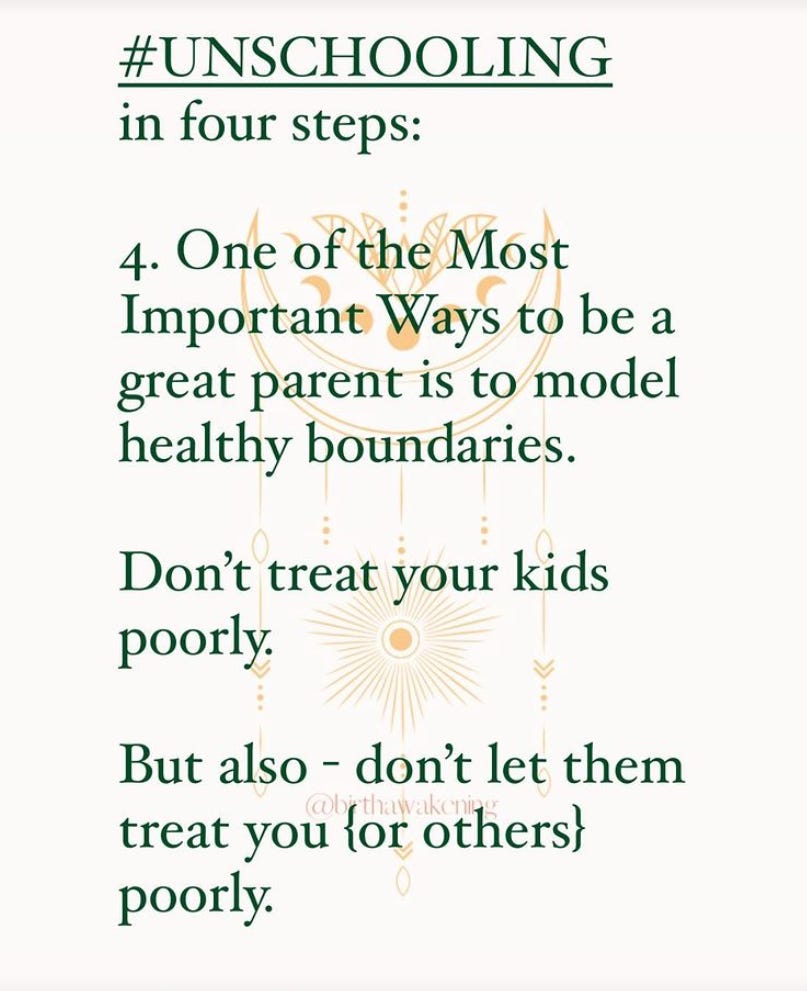I think many parents tend to view their kids as an extension of themselves, as an embodiment of their values, or evidence that they believe/do/feel the right things.. but that's not really healthy or fair to think of kids that way.
our children are unique beings from day one--or as Khalil Gibran puts it, our children are not ours.
if other people think that your child not knowing how to do fractions yet, or disliking their hair to be combed, MEANS SOMETHING NEGATIVE about you as a parent, well...let them think.
their opinions of you as a parent or of your children do not matter.
forcing your child to do something against his will is not going to foster connection and harmony between you.
you are free to prioritize the relationship with your child instead of how society may judge you and your parenting, because of what your child knows, or how he acts/looks.
they're dependent on you, absolutely, but they must be allowed to make their own conclusions in the world--with the "safety net" of our non-judgmental, unconditional love and support when they do make mistakes.
too often we think our job is to soften every blow and "help" them make (what we believe are the) "correct" choices--but really we're keeping them dependent on us--on others, experts, to tell them what's right and wrong, instead of listening to their own inner guidance.
this is the underlying lesson of all forced schooling:
you are too stupid to know what's best for you + what you need to know--here, let US tell you what you need to know...
it creates a culture of dependency and docility.
if a child doesn't want to learn to read, for example, we must trust that eventually they will have one or more experiences that convince them that, actually--it'd be so nice to know how to read--and then we can help them in the way that they want to be helped.
what if they don't?
well, with something as universal as reading, i can't imagine how it wouldn't happen, truly.
can you imagine any child wanting to be illiterate, forever?
jokes aside, sometime before they reach adulthood, they will be interested--compelled--to want to know how to read. and that desire will fuel genius-level comprehension and fervor.
we all have the potential for genius--it's less a state of being and more of a verb.
if something's important, your child will recognize that.
my son did it at age five when he really wanted to know exactly how to play his video games--so he delved into those manuals with zeal.
other kids won't take an interest until later--occasionally much later.
but contrary to popular belief, reading young, or doing anything else young, does NOT give a child any edge in life by the time they reach adulthood.
a child who reads at 2 and a child who reads at 11 will, all other issues aside, be impossible to tell apart by age 14.
i read at age 2--and i mean everything, newspapers, greeting cards, etc. i've always been a writer and a reader.
my German-born hubby learned English at age 16, from television, and learned to read English even later than that.
he's never cared for grammar, spelling, etc--and jokes that he can misspell two languages. Yet he reads much faster than me.
research has consistently proven that it only takes about 100 hours of focused, dedicated effort to go from learning the alphabet to learning to read.
desire is the key for results!
a child that's internally motivated and focused on something of his own choosing can learn almost anything, thoroughly and quickly. that is an experience that hardly ever happens in the current system, and is inhibited even in school-at-home situations.
kids are intensely interested in the way their parents view and interact with the world, but to reject the possibility that they may make different choices than we do (even before they reach adulthood!) is not choosing love and connection, and can become a huge problem in your relationship, especially if you present your opinions as "correct".
for example, vegetarianism used to be a very dear value to me. i knew i'd never allow my children to eat meat--it was just unthinkable.
then i met my husband, an omnivore--and we fought bitterly about whether or not our child(ren) would be allowed to eat meat.
in the end, i realized that one parent eating meat and one parent abstaining was actually going to present a very fair set of choices to the kids--even moreso than both parents being veg or both parents eating meat.
no judgment, no shame, no coercion.
i strive to uphold this in all my interactions with my kids now: no judgment, shame, or coercion for their choices.
i don't make things a battleground when i can choose understanding, curiosity, and connection instead:
"Tell me what you like about that chicken..."
I actually don't agree with the idea that it's "my house, my way" until my kids are 18.
I think they need the freedom to learn from their own choices as much as possible--that way they'll be even better prepared for missteps, because they're able to learn from many of those as a child, under the safety of our roof, as opposed to having free reign for the first time at age 18 or 21 or later, whenever they move out into their own place.
whether it's wearing short sleeves in winter (i bring their jacket, just in case), eating something that i don't think is the healthiest choice, or buying the heavily advertised, pricey toy that i'm sure will break within two days of purchase, i let them learn lessons from these sorts of things as much as is feasible.
that's not to say my kids run the show--but there are many situations where i CAN give them autonomy and relinquish arbitrary control without harming others, myself/them included.
also--unschooling is about respect.
some people take that to mean that instead of kids being forced to respect the parents, as per mainstream parenting models, the parents defer to the kids.
in my opinion that's not sustainable in the long run--nor fair.
respect is extended to and encouraged between every member of the family--yourSelf included.
your freedom ends where another person's begins--no one should have the right to bulldoze or disregard another. (incidentally, i am writing an entire book about this topic)
it's about continually striking a balance, modeling respect for others and for ourselves, and gently intervening when necessary.
for example, my 13 year old's desire to fight with weapons does not mean that he gets to do battle with unwilling participants!
my 10 year old's desire to sing doesn't mean she should do it in the room where others are watching a show or listening to the radio.
find ways to say YES while accommodating everyone's comfort and desires--not just the "squeakiest wheel"--and that includes yourself!
unschooling is a family affair--so pick up that hobby you've always wanted to start and read the books that you've been wanting to read.
do what makes your heart sing--reconnect with your own desires.
not because it's good for your kids, or because they might see you doing X and want to join you ("ooh, they might learn something!")--but simply because it's healthy for you to take care of yourSelf--body and mind.
choosing connection and trust over coercion and fear is the basis of an unschooling lifestyle.
homebirth + human design: RethinkBirth.com
If you’d like more support around unschooling and relationship-based parenting, please become a paid subscriber. Paid subscribers unlock a ton more unschooling content!






